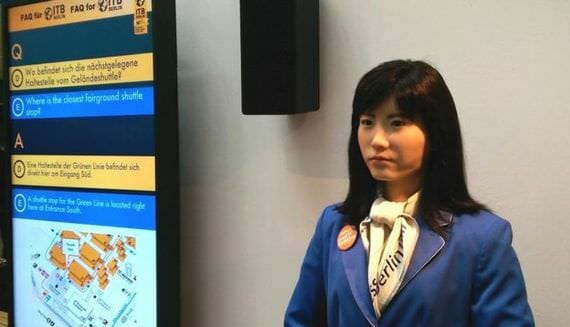Are Robots the Future of the Travel Industry?

There are a few cliches in the world of travel. Service with a smile is one of them. The customer is always right is another. But what if the day comes when robots undermine all of these go-to phrases? What happens when customer service is turned on its head, and instead of a person falsely smiling behind a desk, a robot is sitting there with a blank expression? And the customer won't be able to always be right, because robots won't be in a position to empathise and anyway, to my knowledge, don't make mistakes unless they're programmed to...
This might appear sightly hyperbolic, but it really isn't. Robots are already being used in Japanese hotels to deal with check-ins, while it isn't entirely impossible that customer service could one day be completely automated, from check-in desks to social media responses.
For example, if you visit Henn-na Hotel in Nagasaki, Japan, you will step into the world's first hotel to be completely staffed by robots. At the front desk you will come face to face with two receptionists. Both speak English, among other languages, but that's probably where the normality ends and the strangeness begins. One is a plastic, perfectly airbrushed woman. The other is a dinosaur. Yes, a dinosaur. Oh, and both of them are robots.
While this may a slightly extreme example of robots slowly making their way into the travel industry, there are plenty of other businesses slowly incorporating robots to a lesser extent into the customer-facing side of things. For example, Aloft Cupertino, Residence Inn and Holiday Inn hotels are using robots to deliver room service. If you take a cruise with Costa Cruise Lines, their resident robot Pepper helps out passengers and is trilingual in German, Italian and English. Royal Caribbean's Quantum of the Seas has a Bionic Bar with robot bartenders. KLM's 'Spencer' can be found dealing with customer service at Amsterdam's Schiphol airport - robots are slowly filtering into the travel industry, speeding up and improving services as they do so.
So how do we feel about robots slowly infiltrating the travel industry?
Not that bothered is the answer. According to a study conducted by Travelzoo, 80% of travellers expect to encounter robots frequently by 2020 and almost two-thirds said they are comfortable being served by robots.
The study highlighted a number of interesting trends:
- Chinese, Brazilian and American travellers are the most positive about how robotics and artificial intelligence can enhance travel in general. 92% of Chinese, 73% of Brazilians and 71% of Americans were comfortable with robots in the travel industry. People from other countries were more cautious. Only 37% of Germans and 47% of French respondents said they were at ease with robotic hospitality.
- The biggest driver of the positive attitude towards robots of the future is that people think they will be more efficienct, and have greater data retention and recall. More than three-quarters of respondents think that robots would be better than humans at handling data (81%) and dealing with different languages (79%), while 76% believe robots have better memory overall. And 81% of respondents cited their untiring energy as an advantage.
- But there are some reservations. 75% of respondents believe robots to be impersonal, while 70% don't think they would have the ability to comprehend informal language, local dialects, sarcasm or irony - some of which come in very handy when you're going through a frustrating travel experience.
Speaking in depth about the findings of the Travelzoo survey, the company's European President, Richard Singer said, "Right now is a very exciting moment in the history of the travel industry - groundbreaking technology is revolutionising what is possible from the perspective of customer service, entertainment and personalisation. Robots and artificial intelligence are making their debut on the tourism stage, and our research into global acceptance of robots working in the travel industry is largely positive. Most nations are starting to open up to the idea of robots in travel and see the tangible benefits heading our way in the very near future."
So how could robots and artificial intelligence change the way we do travel?
First up, as several hotel chains are now putting in place, robots could help speed up check-in processes, as they are able to retain information, automate actions and multi-task beyond anything we are capable of.
Second, and perhaps most importantly, as translation software becomes ever more sophisticated, artificial intelligence provides an opportunity for all travellers to conduct the usual formalities in their own language. While this may this spell trouble for talented linguists looking to get into the hotel trade, it also offers customers from all parts of the world to get in depth answers to all the questions, and and could make misunderstandings surrounding bookings a thing of the past.
The importance of a personal touch
While they may be able multi-task, learn, problem-solve and translate better than we could ever hope to, robots lack one element of customer service which will always be memorable and priceless: a personal touch. Going out of your way to help someone, or simply brightening up their day with a generous helping of humanity can often be the difference between an average review and a fantastic one. Currently robots don't have the capacity to exhibit genuine human qualities such as emotion, and can generally be spotted from a mile a way.
When the day comes that this is no longer the case, that we are unable to distinguish robots from humans, we'll probably have bigger things to worry about than the state of the travel industry...